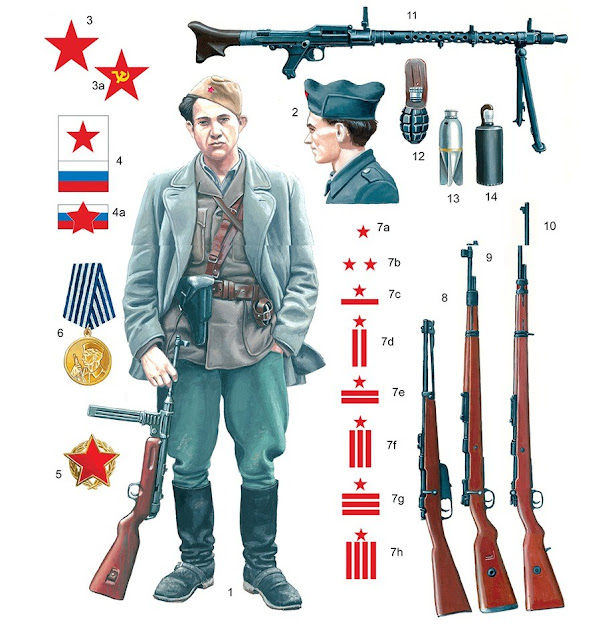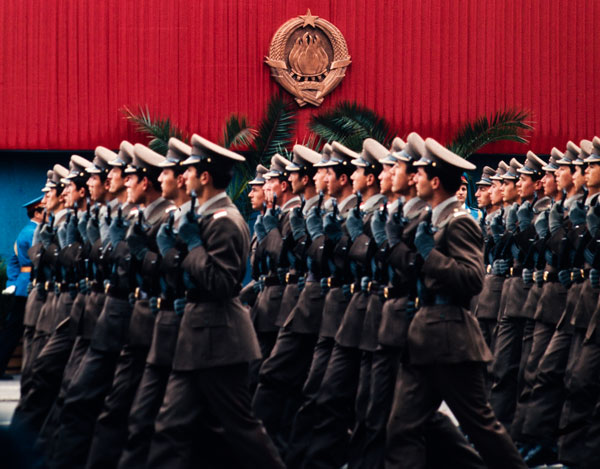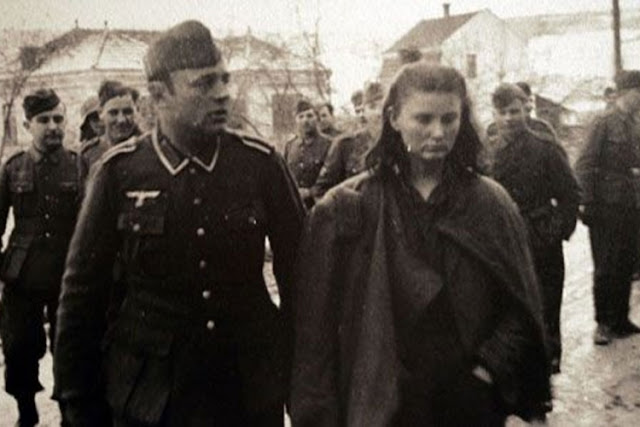Daily report from the Yugoslav battlefield for February 14, 1941 - 45
14.02.1942
·
Three-day battles began in which the reinforced
Home Guard 1st Cavalry Regiment from Sokolac broke into the besieged Rogatica,
but parts of the Romanija People's Liberation Partisan detachment and the
battalion-Bajo Pivljanin-Durmitor NOP detachment inflicted losses of143
soldiers and officers.
·
In the village of Orahovac (in the Bay of
Kotor), the Cucko-Čeklić battalion of the Lovćen People's Liberation Partisan
detachment and parts of the Orjen partisan battalion attacked and, after a day
of fierce fighting, disarmed the Italian crew. Enemy losses: 16 killed and
wounded and 47 captured. The partisans, who had 3 dead and 6 wounded fighters,
seized: 60 rifles, 5 p. machine guns, a larger amount of ammunition, 1
revolver, and other miscellaneous equipment and supplies.
·
After several unsuccessful attempts to penetrate
from Danilovgrad to Nikšić and unblock the 207th Regiment of the Italian
Division -Taro-, strong Italian forces (47th Reinforced Infantry Regiment of
the -Alpi Graje- Division, 2nd and 4th Group of Alpinists -Vale- and two
artillery divisions ), with the help of Chetnik units, undertook an attack in
the main direction Danilovgrad-Nikšić. After five days of fighting, they
overcame the defense (units of the NOP detachment -Bijeli Pavle- and parts of
the Nikšić NOP detachment) and on February 19 penetrated Nikšić. The enemy had
about 30 dead and a significant number of wounded, while the losses of partisan
units were small.
 |
| Fights for Niksic |
·
From Prokuplje, the 14th Infantry Regiment of
the Bulgarian 17th Division and from the village of Shiroki Njiva, a company of
gendarmes and Chetniks of Kosta Pecanac undertook an attack on parts of the
Toplica NOP detachment in Pasiača and Beli Kamen. In the battles near Pasjacki
Vis, Bulgarian soldiers suffered losses of over 35 dead and wounded. The
partisan units retreated towards the village of Statovac and avoided the blow
of the superior enemy. In retaliation, Bulgarian units burned villages on
Pasjaci Mountain, shot about 100 and interned more than 300 people.
 |
| Chetniks of the Kosta Pecanac, also known as “black” Chetniks |
14.02.1943
·
Near the village of Bravnice, units of the 9th
Krajina Strike Brigade of the 10th Strike Division of the NOVJ destroyed the
Jajce - D. Vakuf railway and attacked a transport train. 10 home guards and 1
German soldier were captured, and the train was set on fire.
 |
| Headquarters of the 9th Krajina Strike Brigade |
·
The Ustasha-Home Guard forces of over two
battalions and a combined detachment of gendarmes and Volksdeutscher started a
three-day concentric action of "cleaning" the premises of the village
of Budjanovci - the village of Simanovci - the village of Ogar (in southern
Srem). Under enemy fire, in difficult weather conditions, several thousand
refugees (men, women and children), with part of the 4th Battalion of the 3rd People's
Liberation Partisan Detachment of the 3rd Operational Zone of the NOV and PO of
Croatia, withdrew to the marshy area of Bene (near the village of Ogara) and
thus avoided complete encirclement and destruction. The enemy killed 8 and
arrested 92 people.
·
In the village of Belegiš (near Stara Pazova),
the Ustasha police brutally killed 21 people, and drove many people to Stara
Pazova, then to Germany, to forced labor.
14.02.1944
·
The President of the Refugee Government of the
Kingdom of Yugoslavia, Božidar Purić, warned Ambassador Bogoljub Jevtić, in
London: to ban Draža Mihailović's representative, Lazarević, from giving any
statements, because they harm the Ravna Gora movement.
·
After 45 hours of uninterrupted march, the 1st
Macedonian-Kosovo NOU Brigade arrived in the village of Bahovo (in Karadjoja,
Greece). With that, she finished her February march, crossing 260 km. In that
campaign, she fought for 14 days, continuously, against much superior enemy
forces, breaking through the blizzard and high snow, at a very low temperature,
without food, poorly dressed. Despite this, it managed not only to preserve its
manpower but also, by tying strong Bulgarian forces to itself, to facilitate the
movement of the Group of Partisan Battalions (-Stevan Naumov- and -Hristo
Botev-), the Central Committee for Macedonia, through eastern Macedonia to the
region Kumanova, For the courage and firmness shown, the brigade was praised by
a written order from the General Staff of the People's Liberation Army for
Macedonia.
 |
| Fighters of the 1st Macedonian-Kosovo Brigade during the February March. |
·
Northeast of Celje, the 13th Slovenian Brigade -
Mirko Bračič - of the 14th Division of the People's Liberation Army of
Yugoslavia fought hard against German units that were advancing towards the
village of Dramlje from the direction of Sveti Jurij. In the evening, across
the road Slovenske Konjice - Vojnik, the division broke through to the section
of the village Lindek - M. gora, where it was surrounded again.
 |
| 13th Slovenian National Liberation Brigade |
·
In the area of the village of Dege (near
Tropoja, in Albania), superior German units and ballists defeated the Malesijski
People's Liberation Partisan Detachment (about 200 fighters). 18 German
soldiers were killed and wounded. The detachment had 11 dead. Only about 80
fighters, mostly from the partisan battalion - Bajram Curi -, managed to
retreat in an organized manner, in parts, towards Gjakova and Luma (in
Albania).
14.02.1945
·
After a two-day fight against the majority of
the German 369th Legionary Division and parts of the Ustasha Home Guard 9th
Mountain Division, the 26th and 19th Strike Divisions of the People's
Liberation Army of Yugoslavia (without the 5th Strike Brigade), the 12th and
13th Herzegovinian Strike Brigades of the 29th Strike Division of the People's
Liberation Army , The 1st Tank Brigade of the People's Liberation Army and the
Artillery Brigade of the 8th Strike Corps of the People's Liberation Army
liberated Mostar.







Comments
Post a Comment